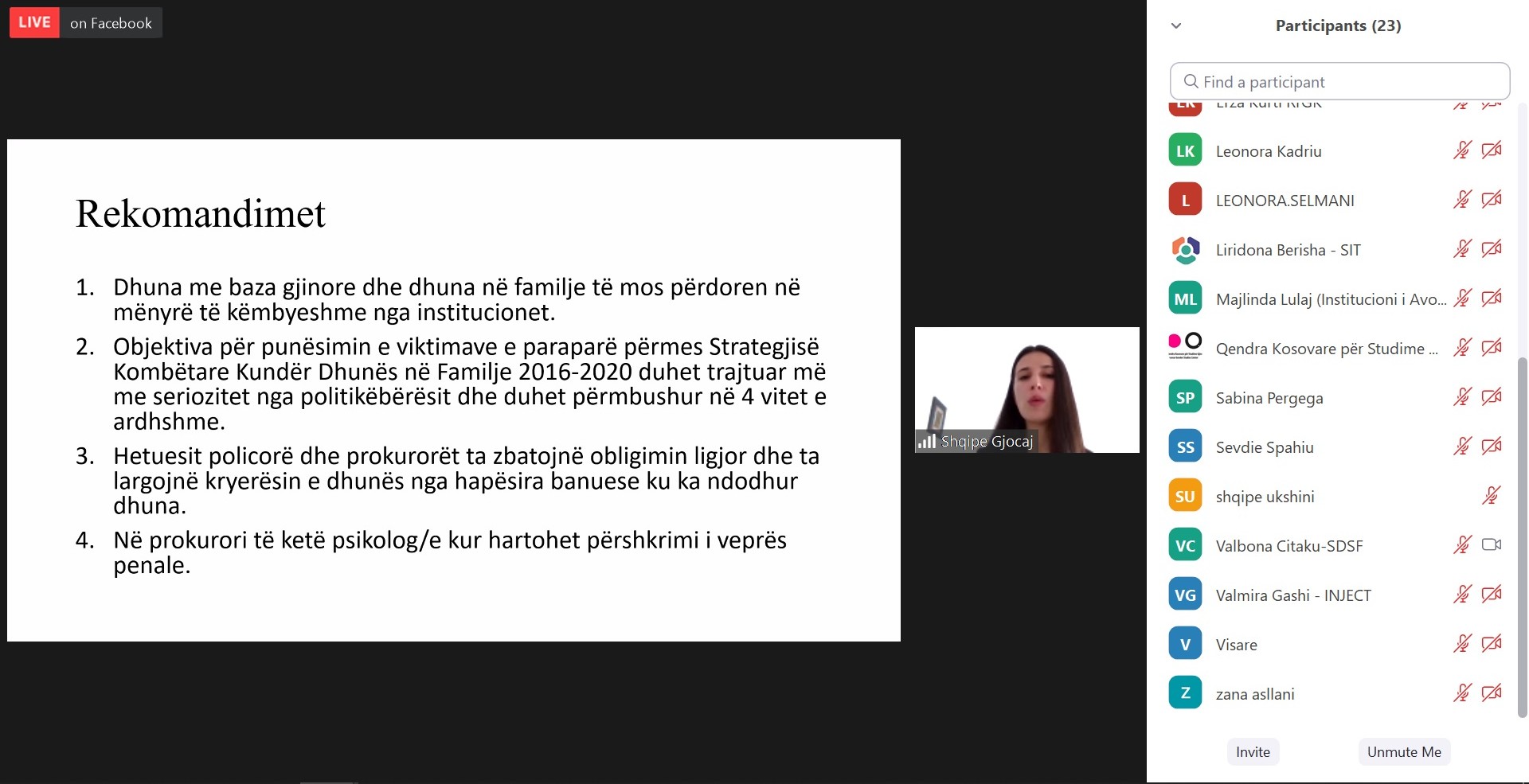
AMC, supported by CFLI, organized a roundtable discussion on “Gender-Based Violence in Kosovo: Institutional Chain and Stagnant Aspects”
16.03.2021
Action for Mothers and Children (AMC), supported by the Canada Fund for Local Initiatives (CFLI), organized a roundtable discussion on “Gender-Based Violence in Kosovo: The Institutional Chain and Stagnant Aspects”.
The purpose of the roundtable was to serve as a platform for discussion between stakeholders on the state of the chain process from reporting violence, inter-institutional cooperation, to addressing cases. The main question of this roundtable was how to improve inter-institutional cooperation in order to reduce the number of cases of violence in Kosovo and the successful rehabilitation of victims.
The roundtable brought together relevant actors in this field such as: Kosovo Police, Prosecutorial Council, Department of Forensic Medicine – Ministry of Justice, Kosovo Judicial Council, Ministry of Labor and Social Welfare, Gender Equality Agency within the Office of the Prime Minister, Institution of the People’s Advocate, civil society organizations, etc.
Vlorian Molliqaj, Executive Director of AMC stressed that since 2013 AMC is addressing the topic of gender-based violence with health workers, ie increasing the capacity to identify and report violence by health workers. In the future AMC plans to support and empower other actors such as safe houses, helplines, etc.
Adile Shaiqiri, Head of Social Services Division – Department of Social and Family Policies in the Ministry of Labor and Social Welfare said: “Some of the challenges that this institution has are the lack of budget for professional social services, ie the lack of a specific grant and lack of of protection of workers providing social services. ”
Adelina Berisha, Program Manager for Addressing Gender-Based Violence in the Kosovo Women’s Network spoke about the role of women’s non-governmental organizations in combating domestic violence. Among other things, he stressed that it is important for state mechanisms to favor and discriminate positively for survivors of domestic violence, for example through the facilitation of grant application procedures for shelters, favoritism in Vocational Training Centers and Employment Offices.
Shqipe Gjocaj, presented the policy summary “Gender-Based Violence in Kosovo: Institutional Chain and Stagnant Aspects”. The main findings of the study show that the inter-institutional chain of treatment of gender-based violence is stagnating in some aspects but mostly the part of rehabilitation and reintegration of survivors is stalled. The main recommendations of the study are: The objective for the employment of victims envisaged through the National Strategy Against Domestic Violence 2016-2020 should be treated more seriously and fulfilled by policy makers; Police investigators and prosecutors enforce the legal obligation to remove the perpetrator from the residential area where the violence took place; To have a psychologist in the prosecution when drafting the description of the criminal offense; open Sexual Violence Survivors (Rape Crisis Centers); Continue the specialization and training of police officers, prosecutors and judges in the context of all forms of gender-based violence, including sexual violence, how to approach victims of trafficking, how to deal with sexual violence against children.
The main recommendations of the study are: The objective for the employment of victims envisaged through the National Strategy Against Domestic Violence 2016-2020 should be treated more seriously and fulfilled by policy makers; Police investigators and prosecutors enforce the legal obligation to remove the perpetrator from the residential area where the violence took place; To have a psychologist in the prosecution when drafting the description of the criminal offense; open Sexual Violence Survivors (Rape Crisis Centers); Continue the specialization and training of police officers, prosecutors and judges in the context of all forms of gender-based violence, including sexual violence, how to approach victims of trafficking, how to deal with sexual violence against children.





